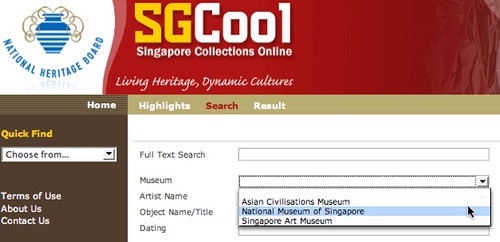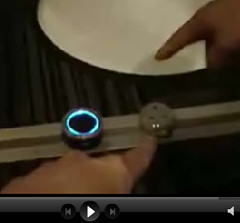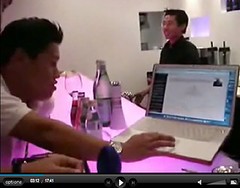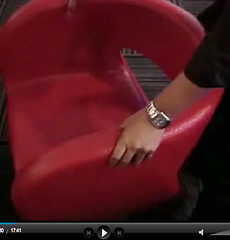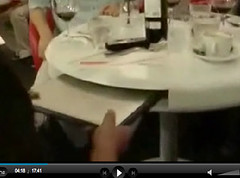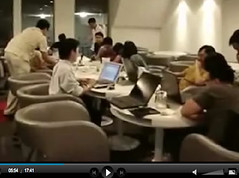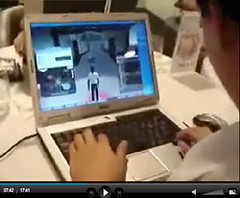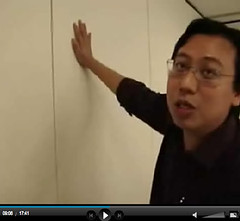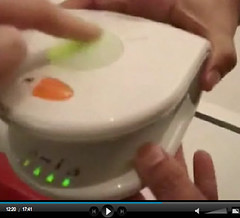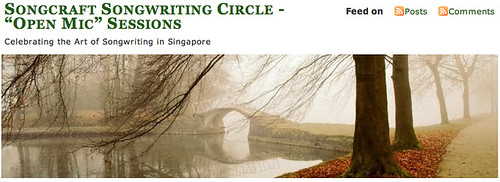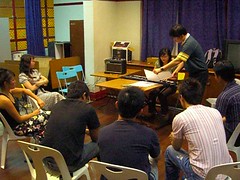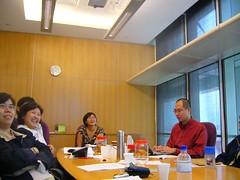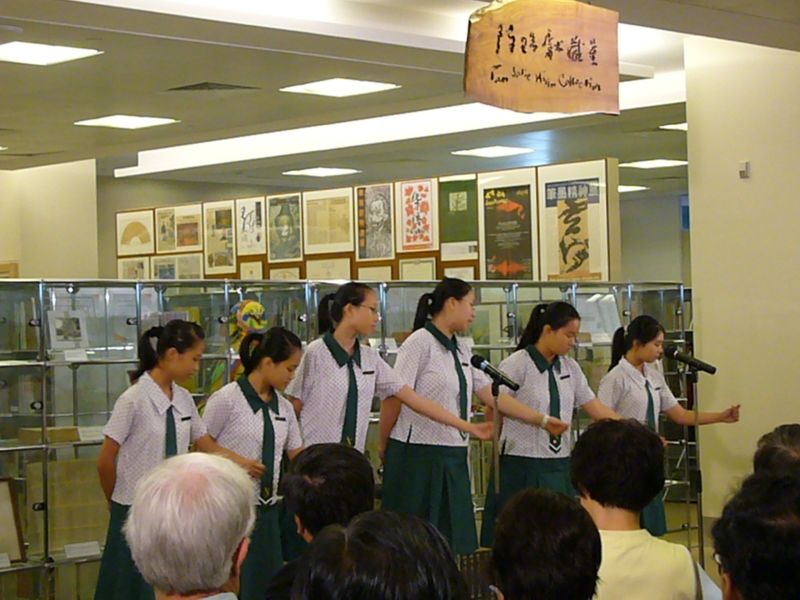That's what a 10-year old boy wrote on the feedback form, for the workshop my colleagues and I conducted today, titled "Smarter Bloggers’ Workshop: Internet adventures of Little Red Riding Hood, her Grandma and the Wolf".
He wasn't wrong. The workshop title could have left the blogging part out, as we didn't really touch on how to blog.
We named it "Smarter bloggers" as it's about how they can be smart and protect themselves should they choose to go online to start blogs and stuff. That being said, I think we'll have to review the workshop title.
MOE Language Arts Festival 2007
A total of 56 students, all 10-year olds, attended -- 30 kids in the morning session; 26 for the afternoon one. Our workshop was just one of the many language and arts related sessions conducted by various parties for the Language Arts Festival 2007, organised by MOE aimed at Primary Three level students from various schools.




How did I get involved in this?
A MOE staff who'd attended the talk I did for the Civil Service College. At first, the proposal was for me to conduct a 90 minutes blogging workshop for 10-year olds. After further discussion, we agreed it was more feasible and more critical to focus on Cyber-safety.
To make the session more interesting, I thought we'd use the Little Red Riding Hood fairy tale to convey Cyber-safety tips. For instance, Red Riding Hood gave away details to the wolf (a stranger) on where she was going, and where her grandma lived... you get the idea.
And to be consistent with the Language and Arts theme, the students would be required to work in groups to write and present their version of a fairy tale that incorporated Cyber-safety concepts.
Although Children Services isn't my forte, I ended up conducting the session since the overall workshop outline was from me, and other Children's Librarians weren't sure how to deliver it. Luckily I had help from two of my librarian colleagues from Children's Services. They helped flesh out the workshop content. One of them volunteered to help assist in the morning session, and I had help from another NLBA colleague to help manage the kids.
Session outline
- First we told the Red Riding Hood fairy tale (the "traditional" Grimm Brothers version). Where possible, we had the kids tell parts of the story. This was a suggestion from a Children Services colleague, and it worked wonderfully. My colleague also suggested that we check if the kids knew the "traditional version", as nowadays the fairy tales they read might be modern or heavily modified versions.
- Then we introduced four to five Cyber-safety concepts (e.g. "Don't reveal personal information to strangers online", "Do not meet strangers face-to-face alone").
- To reinforce the concepts, we told an updated version of Little Red Riding Hood, where she chatted with the Wolf online. Kudos to my colleague, Yasmin M. A., for coming up with the cyber-version. The kids found the story funny and engaging. We ended the story by quoting real-world criminal cases of how some children were victimised by deceitful adults after engaging in online activities.
- For the next 20 to 30 minutes, we made the kids work in groups. Their assignment was to write a story that included at least two Cybersafety concepts AND at least two cartoon/ fairy tale characters.
- Finally, each group had to present their story, not exceeding five minutes. They could use powerpoint, or draw on paper.
What the kids came up with
- All of them were able to cite cyber-safety concepts in their presentation. I thought that was clearly demonstrated in their presentations.
- Shrek and Spongebob Squarepants seemed to be the more popular characters. The generation gap couldn't have been wider! I identified more with "Snow White" and "Three Little Pigs".
- Then there were the Three Blogging Billy Goats Gruff, who knew karate.
- One group presented a powerpoint on "How Mr Krabs got cheated"
- One had Jerry (from Tom and Jerry) and Donald Duck, who were kidnapped by Wicked Mickey Mouse (see the two pictures that follows)
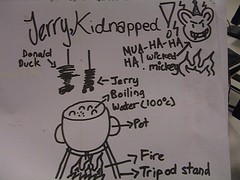
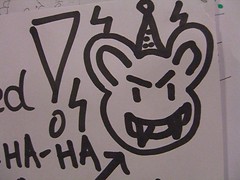
Overall effectiveness of the workshop
It would have been better if there was more time. Inevitably, there were kids who were clearly not as participative as we'd like them to be. I don't see it as their fault. The manner in which we tried to engage these few just didn't work out.
What was pleasantly surprising to me was how majority of them threw themselves into the task given. All groups managed to present a story.
Even after my Children's Librarian colleague reviewed the workshop outline and said the kids would be able to grasp what was required of them, I still had some doubts. I mean, these were 10-year olds who had to develop an original story, with a time constraint, and work with some people whom they didn't know. I would have considered the workshop a failure if there was one group that didn't manage to produce any story.
What some kids wrote about the workshop
- "Workshop was interesting and I liked it"
- "I will like to a attend more of these courses in future"
- "Give longer time"
- "Let us explore freely and extend the time"
- "Make it more interesting"
- "It can be more more interesting if we can use all the rules of the cyber safety and do not show powerpoint slide show"
- "This workshop teaches me many new things that I would like to share with my family and friends"
- "This workshop is cool"
- "Very interesting"
- "The groupwork was pleasant and I enjoyed the activity very much."
- "This workshop is fun and stimulating. It teaches us online safety"
- "I hope to go to more workshops like this in the future. It is very interesting and I have learnt about cybersafety"
Adult participants might give you a low rating, or they might not. I'd get disappointed but that's part of training. But for kids, I'd always remember what I heard Edwin Thumboo mention in his speech one time: "Teachers don't make mistakes; they leave scars".
Whether it's a 30-minute storytelling session, or 90-minute workshop, or 12 months of school -- the librarian, teacher, adult has a heavy responsibility.
I think most 10-year olds tend to tell it like it is. I hope their opinions about the course was honest. Most indicated in the forms that the workshop was useful.
And at least one 10-year old gave his honest opinion about the workshop -- the one who wrote that he expected a workshop on blogging. He actually indicated, for other questions in the form, that the workshop was useful and enjoyable. I remember him as an active participant during the session.
I also noted how he wrote "I was wrong" (about the workshop) rather than blame the trainer for misrepresenting the workshop title. I guess he's at an age where respect for authority is still high on his list. Good for you, kid.
Hey kid (I think his name was Paul), for what it's worth, if you ever come across this post when you're older, I'd like you to know you have my gratitude for your honest comments. I would have loved to conduct a blogging workshop for 10-year olds like yourself. After today's session, I'm pretty sure how we can offer such a workshop.
So who knows? :)
p.s. Thanks to colleagues Raneetha, Yasmin, Hong Li; Zee May the student helper; and all the 56 kids who turned up today.







